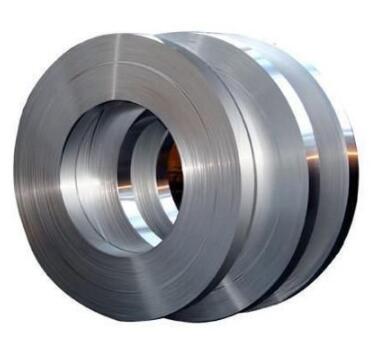Let’s compare and contrast different material options commonly used in manufacturing for springs, wire forms, and stampings:

1. Tempered Stainless Steel Strip:
Key Characteristics: corrosion resistance, durability, high strength, aesthetic appeal, high & low temperature resistance
- Springs: Tempered stainless steel strips are ideal for springs requiring corrosion resistance and high strength. They are commonly used in applications where the spring must withstand harsh environments.
- Wire Forms: Stainless steel wire forms from tempered strips are versatile, offering good strength and corrosion resistance. They are suitable for a wide range of applications.
- Stampings: Stampings made from tempered stainless steel strips are durable and corrosion-resistant. They are used in components where strength and longevity are critical.
2. Annealed Stainless Steel Strip:
Key Characteristics: flexible, lower strength, corrosion resistant
- Springs: Annealed stainless steel strips are less rigid and have lower strength than their tempered counterparts. They are suitable for springs in less demanding applications.
- Wire Forms: Annealed stainless steel wire forms are flexible and easy to bend. They are used in applications requiring formability rather than high strength.
- Stampings: Annealed stainless steel stampings are less rigid and can be formed more easily. They are used in applications where flexibility and corrosion resistance are important.
3. Annealed Carbon Steel Strip (1050/1074/1095):
Key Characteristics: cost-effective, flexible
- Springs: Annealed carbon steel strips provide good formability but may lack the strength and corrosion resistance of stainless steel. They are suitable for lower-stress springs.
- Wire Forms: Annealed carbon steel wire forms offer flexibility and affordability but may not have the corrosion resistance of stainless steel.
- Stampings: Annealed carbon steel stampings are cost-effective and suitable for applications where corrosion resistance is not a primary concern.

4. Tempered Carbon Steel Strip (1075/1095):
Key Characteristics: high strength, durable
- Springs: Tempered carbon steel strips are known for their high strength and durability. They are used in heavy-duty springs.
- Wire Forms: Tempered carbon steel wire forms provide excellent strength and are suitable for demanding applications.
- Stampings: Stampings made from tempered carbon steel strips are robust and reliable, ideal for components in high-stress environments.
5. Low Carbon Strip (1008-1010):
Key Characteristics: low cost, easy to form, does not have spring characteristics
- Springs: Low carbon strips are less strong but more flexible than high-carbon steel. They are used in springs requiring moderate strength and flexibility.
- Wire Forms: Low carbon steel wire forms are flexible and cost-effective, making them suitable for various applications.
- Stampings: Stampings made from low carbon steel strips are easy to form and are often used in applications where cost efficiency is crucial.
6. Tempered Martensite (M130/0160/M190):
Key Characteristics: pre-tempered, lower cost option as compared to heat treat and plating annealed carbon spring steel
- Springs: Tempered martensitic steel strips offer exceptional strength and toughness. They are used in high-performance springs.
- Wire Forms: Wire forms made from tempered martensite provide excellent strength and durability, ideal for demanding applications.
- Stampings: Stampings from tempered martensite steel strips are exceptionally strong and resistant to wear, making them suitable for heavy-duty components.

7. Brass, Phosphor Bronze, Beryllium Copper:
Key Characteristics: conductive, corrosion resistant, can be costly
- Springs: These materials offer excellent corrosion resistance and electrical conductivity. They are often used in electrical contacts and connectors.
- Wire Forms: Brass, phosphor bronze, and beryllium copper wire forms are utilized in electrical and electronic applications due to their conductivity and resistance to corrosion.
- Stampings: Stampings made from these materials are commonly used in electrical connectors and components where conductivity and corrosion resistance are essential.
8. Round Music Wire:
Key Characteristics: strong, elastic, resilient
- Springs: Music wire is known for its high tensile strength and elasticity. It is commonly used in musical instruments and precision springs.
- Wire Forms: Music wire is versatile and used in various wire form applications, especially when high strength and resilience are required.
- Stampings: Stampings from music wire are uncommon but can be used in specialized applications where high-strength components are needed.
9. Round Basic Cold Rolled Steel:
Key Characteristics: Cost effective, versatile, not resistant to corrosion
- Springs: Cold-rolled steel is versatile and cost-effective, making it suitable for various types of springs, especially those not requiring high corrosion resistance.
- Wire Forms: Cold-rolled steel wire forms offer flexibility and affordability, making them suitable for general-purpose applications.
- Stampings: Stampings made from cold-rolled steel are used in a wide range of applications, including automotive and construction, where cost-effectiveness is crucial.

10. Inconel Round Wire & Strip
Key Characteristics: strong, high temperature resistance, corrosion resistant, expensive
- Springs: Given inconel is known for its exceptional strength and resistance to extreme environments, it may be the ideal material for springs in engines, turbines, and exhaust systems where high temperatures are prevalent, there is a high likelihood of exposure to harsh chemicals, or where high load-bearing capacity is required.
- Wire Forms: Inconel wire forms are great for applications where both high-temperature resistance and structural integrity are crucial. Examples include medical devises, safety-critical applications because these wire forms maintain their shape under continuous high-temperature, high-stress environments.
- Stampings: Although quite rare, stampings made from inconel would include the key characteristics listed above and be most effective in demanding applications.
11. Stainless Steel Round Wire
Key Characteristics: durability, corrosion resistant, aesthetic appeal, hygenic qualities, heat resistance
- Springs: Stainless steel round wire is highly versatile and used in applications where a balance of strengh, corrosion resistance, and aesthetic qualities are needed. Examples spring applications include automotive and aerospace suspension systems, medical devices due to hygenic properties and biocompatability, and electronic devices requiring precise and durable springs like switches and relays.
- Wire Forms: Similar to springs, stainless steel wireforms are used across various industries including medical, firearm, household appliances, and even marine applications given the material’s resistance to saltwater corrosion.
- Stampings: Although stampings are not typically ever made from round wire, some stainless steel round wire components are well suited to run on fourslide equipment. Examples include small, high volume components often used in electronic or aerospace applications.
In summary, the choice of material for springs, wire forms, and stampings depends on the specific requirements of the application, including factors like strength, corrosion resistance, formability, and cost-effectiveness. Each material has its own set of advantages and limitations, allowing manufacturers to select the most suitable option for their particular needs. Interested in working with our engineers to determine the best material for your design? Contact our team today.
